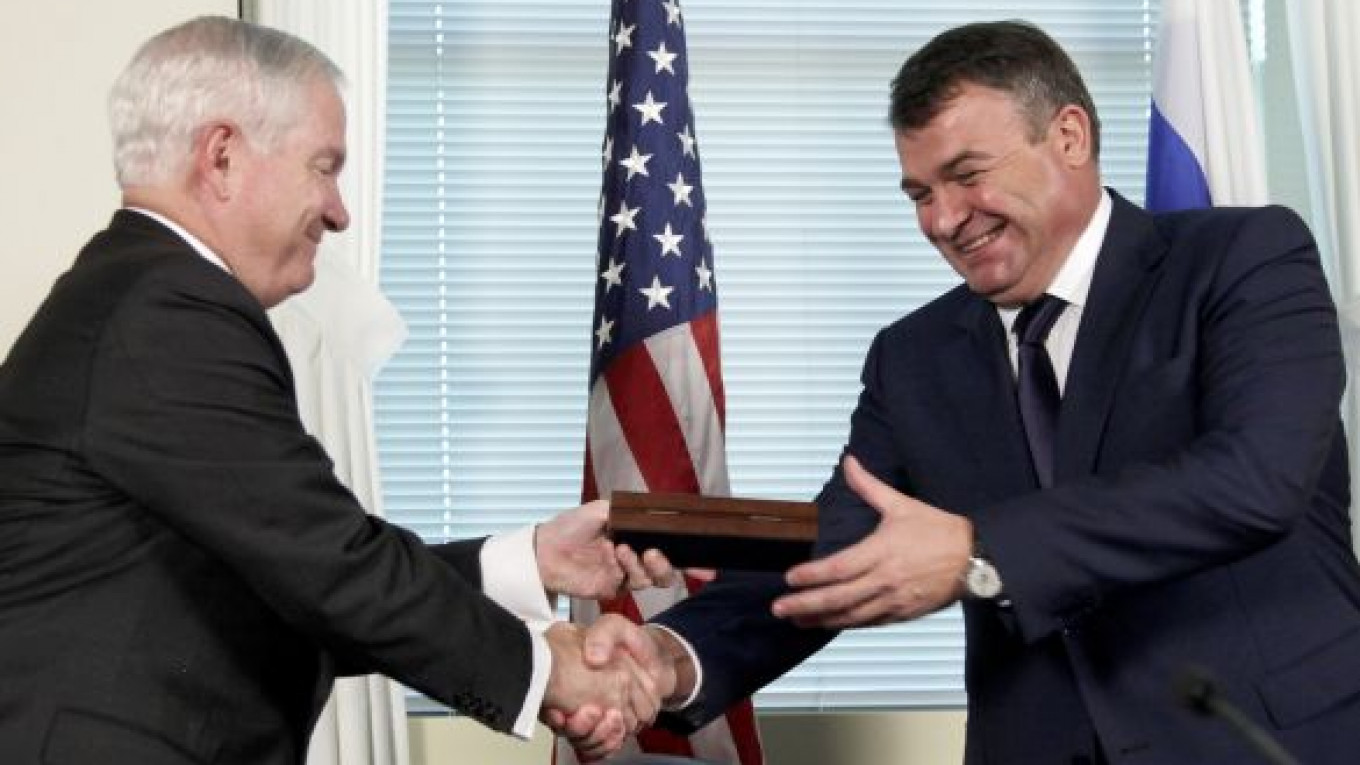WASHINGTON — U.S. and Russian defense chiefs commiserated about "painful" military reforms and signed accords on Wednesday stepping up dialogue, gestures that aimed to show improving ties between the former Cold War foes.
U.S. Defense Secretary Robert Gates and Defense Minister Anatoly Serdyukov also discussed thorny issues during their series of talks, including U.S. plans for a missile defense system in Europe and Russia's cease-fire with Georgia. There were no breakthroughs on those issues.
But the talks were portrayed positively by both men, who were to dine together on Wednesday evening on a U.S. Navy barge in the Potomac River — capping off more than five hours of meetings in a single day, an unusual amount of Gates' time for any foreign dignitary, aides say.
"I do hope that my visit to the United States will provide a very powerful impetus to the development of relations between our two nations," Serdyukov told reporters.
Gates said the accords they signed would ensure more frequent meetings between the two defense chiefs — at least one a year — and pave the way for more joint programs, exchanges and exercises between the two nations' militaries.
Ties between the United States and Russia have been slowly recovering since tensions over Russia's 2008 war with the pro-Western former Soviet republic of Georgia. U.S. President Barack Obama took office last year seeking to "reset" relations.
Proponents say Obama's efforts helped win Russian support for sanctions on Iran as well as on military supply routes for the Afghan war. It also yielded the New START arms reduction treaty, which faces an uncertain path to approval in the full U.S. Senate.
A key Senate committee was expected Thursday to approve the treaty, which commits Russia and the United States to reduce deployed nuclear warheads by about 30 percent.
A senior U.S. defense official, briefing reporters after the talks, said the State Duma was awaiting U.S. action before pursuing ratification further.
"They've had some preliminary hearings but decided they're going to let the Senate go first," the official said.
Gates and Serdyukov both used the word "painful" to describe reforms they are pursuing in their militaries, belt-tightening that has defense industry executives and military commanders girding for leaner times, globally.
In the United States, Gates has announced controversial plans to shut down an entire military command and ax at least 50 officers and 150 senior civilian executive posts, efforts meant to help save $100 billion over five years.
Serdyukov, who analysts say is unpopular among much of the military, is pursuing far more dramatic cuts in the number of officers and the size of the armed forces.
"He and I face similar leadership challenges," Gates told reporters, with Serdyukov sitting beside him. "We are both working hard to achieve sweeping, sometimes painful, but very necessary reforms in our respective militaries."
Analysts say the amount of time Gates set aside for Serdyukov was a message in itself. Serdyukov is the first Russian defense minister to set foot in the Pentagon in more than five years.
"This is a lot of quality time with Secretary Gates," said Heather Conley at the Center for Strategic and International Studies, a Washington-based think tank.
Pentagon spokesman Geoff Morrell said he believed that calls for deeper ties by Gates and Serdyukov send "a very strong signal through their respective organizations that they expect greater cooperation down the chain."
U.S. officials also said they were talking with Moscow about allowing lethal cargo for the Afghan war to travel along Russian rail routes, currently limited to non-lethal cargo.
Still, difficulties remain, including on issues like missile defense and Georgia. A U.S. defense official said Russia did not back away from its concerns over U.S. missile defense efforts in Europe.
"Serdyukov did say that the Russian position is well known. … I would not say there was any breakthrough in this discussion," the official said.
On Georgia, Gates renewed U.S. calls for Moscow to comply with the 2008 cease-fire agreement. This includes ending what Washington sees as an "occupation" of Georgian territory and withdrawing Russian troops from breakaway South Ossetia and Abkhazia regions to their pre-conflict positions.
A U.S. official said Gates also urged Russia to provide more transparency about its forces in the separatist regions, noting a need for international observers, absent since 2008.
A Message from The Moscow Times:
Dear readers,
We are facing unprecedented challenges. Russia's Prosecutor General's Office has designated The Moscow Times as an "undesirable" organization, criminalizing our work and putting our staff at risk of prosecution. This follows our earlier unjust labeling as a "foreign agent."
These actions are direct attempts to silence independent journalism in Russia. The authorities claim our work "discredits the decisions of the Russian leadership." We see things differently: we strive to provide accurate, unbiased reporting on Russia.
We, the journalists of The Moscow Times, refuse to be silenced. But to continue our work, we need your help.
Your support, no matter how small, makes a world of difference. If you can, please support us monthly starting from just $2. It's quick to set up, and every contribution makes a significant impact.
By supporting The Moscow Times, you're defending open, independent journalism in the face of repression. Thank you for standing with us.
Remind me later.






